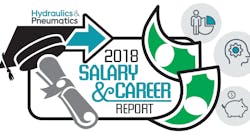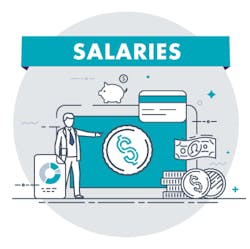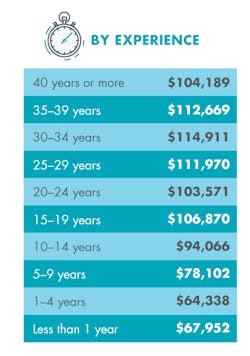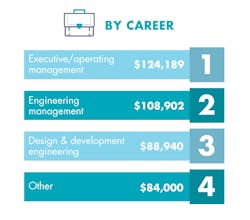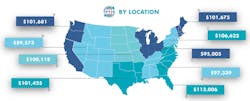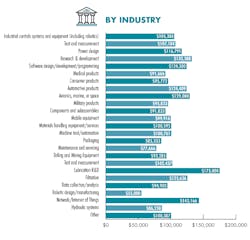Part 3 of our 2018 Salary and Career Report reveals good and bad news. According to your colleagues who answered our survey, you are adequately paid. Two-thirds of them said so, anyway. The bad news, according to many of them, is that “adequate” is about as good as it’s going to get for a while. Opportunities will be there, however, for those who bide their time.
One of our younger respondents characterized your current situation as a Catch-22.
“Since the recession, companies have adopted a stance where they are obsessed with making more profits with fewer resources—being more ‘efficient’—especially with their labor costs. As a result, pay raises barely keep up with inflation rates, if raises come at all. The only hope to get an appreciable pay raise nowadays is to get hired by a different company. The catch is that after a few times, prospective employers start seeing such applicants as a flight risk. What’s worse, a stagnated wage or becoming unemployable?”Where the Money Comes From
When asked, “How will your total 2018 compensation (salary, bonuses, etc.) compare to what you earned in 2017?,” 28% expect no change, while about 64%--though expecting an increase--expect no more than 5% at very best—with a 3% raise being the most common expectation—just above the inflation rate. Eight percent expect a drop in salary. A lucky 11% of those thinking “raise” expect an increase of 10% or more.
Across all age groups, the average yearly salary is about $100K. The incentives that sweeten this pot of money vary, but the idea behind them is to keep good people from jumping ship. About 83% of respondents indicated their employers are funding at least part of their retirement. The most common way is the good old 401K (reported by 86%). Other carrots varied widely, from profit sharing (22%), to bonuses (18%), to stock ownership (12%), to IRAs (8%). Pensions and company ownership were benefits enjoyed mostly by the senior respondents (50-65 years old), reported by 21% and 11% of them, respectively.
The Earners
Job titles ranged across the board, but the most common among most age groups was “Design engineer/project engineer/R&D engineer.” However, in the 50-65 age range, “President/owner/CEO/partner/other executive management” was claimed by the largest chunk: 17%--followed by the afore-mentioned Design Engineer. Could this mean that loyalty to an employer is ultimately rewarded with a push up the ladder? Many believe the growing need for Hydraulics expertise will keep technical positions in this field attractive as technologies advance.
“There's a lack of expertise to fill technical positions in hydraulics,” one respondent stated. “Hydraulics is somewhat of a mystery to industry and companies globally have difficulty finding talent to support the highly technical machines out there today.”
“There’s a need for more efficient, longer-life equipment, and automation and robotics are advancing at a rapid pace,” another said. “Look around, almost every building and every piece of equipment will need to be replaced within 50 years. We need engineers.”
“At the current rate of development, talented engineers are in short supply,” another colleague agreed. “That means salaries will continue to rise. Opportunities for engineers lie along the technical and management paths.”
One respondent made it plain: “Most degreed engineers know little about hydraulics and pneumatics.”
Indeed, a quarter of all respondents indicated that hydraulics is the focus of their current design projects, followed by Industrial controls systems and equipment (including robotics) (identified by 11%), with maintenance and R&D filling the remaining project gaps.
Engineers who can claim all these skills may not need or want to climb a corporate ladder to command much more than their current salary. One respondent was particularly bullish about your earning power:
“With this limited skill set and more talent moving to management and other sides of business, the demand for engineering skills will grow and that should attract better pay.”
For stars in the making who accumulate skills in all those disciplines, $100K may not even be good starting pay. Food for thought if you’re building your next rock star engineer—or if that rock star happens to be you.
Additional Comments From Survey Participants
“Salaries continue to be good at starting and progress well throughout careers in engineering. More important are the non-engineering opportunities in supply chain, operations, sales, marketing, quality and executive roles based on the foundation of engineering acumen.”
“With the renewed economic enthusiasm, I think there is more demand for products which equates to more demand for engineers. At one time, the industry predicted that all engineering would be off shore, but I think the mistakes of the past have proven that having engineers close to the factory yields the most success.”
“Most degreed engineers know little about hydraulics and pneumatics.”
“I think salaries have been fairly stagnant since the 2009 recession. Within the past five years, there has been an increase in engineering outsourcing at my company to contain cost. As such, the focus has been on project management, not engineering. I don't think there are as many career opportunities for engineers outside of project/program management.”
“Manufacturing is on the rise, and the workforce is aging.”
“As demands for operations to run lean with less maintenance intervention grow, there will be more front-end loading on the engineering side to ensure systems will run reliably and can be repaired quicker.”
“Five years ago there was little to no potential for salary advancement. In the past year the lack of engineering talent available in the market has driven wage ranges up.”
Tom Andel is a contributing editor to Hydraulics & Pneumatics.
